In my mid-twenties, I visited Ostia Antica, a massive archaeological site just outside of Rome. As different as the Romans were from the culture and the world I grew up in, the city itself felt remarkably familiar: a cemetery, a main street, a theater. Just around the corner from the churches and temples was a little sports bar with mosaics of favorite wrestlers on the floor. You can just imagine a rowdy crowd leaving weekend worship and heading to the local bar for wings and a cold one (or, in the Roman case, lamb with garum and an amphora of wine). It was a reminder that, as humans, more ties us together than keeps us apart.
We often need these reminders. Humanity is so fond of our little boxes, of our us versus them, of our species and genres and cliques and races. In the process of understanding ourselves and our world, we break down the great truths into smaller truths, and then everything gets registered, ordered, stamped, implied, inferred and declared until we’re arguing over the classification of single grains of sand.
I could see a “sports bar” in the bones of that Ostian building because, in the end, underneath our thick white skulls are the same structures through which we understand our world: music, dance, storytelling, religion, politics. In all of the best moments of our species’ existence, we assume that real truth of our common humanity.
But what if Ostia had been an alien city? Can you really assume anything when it comes to an alien race? How much harder would you have to work, and how much more science might you have to do? Pay attention, eager first-contacter, and put aside all of your human classifications and assumptions, or you’re going to find yourself in trouble—just like some of the characters in these books.
The Sparrow by Mary Doria Russell
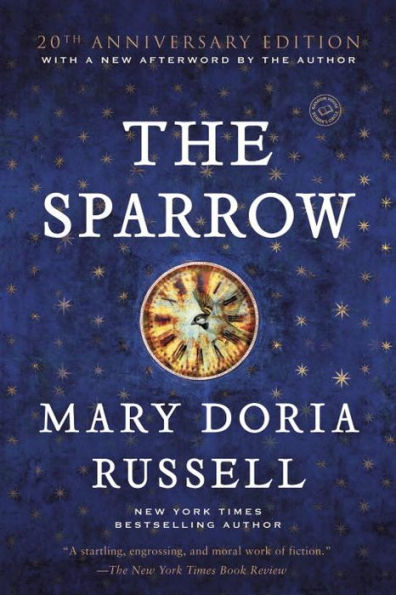
This book demolished me so hard during the fall of 2001 that I turned around and changed my entire senior bachelor’s thesis overnight so I could spend the next semester puzzling out the theological implications of the events it chronicles. Father Emilio Sandoz, a Catholic Jesuit priest, is a member of the first mission to the planet Rakhat, where two sentient races, the Runa and the Jana’ata, live entirely separate existences. The Jesuits—being Jesuits—discovered Rakhat through broadcasts of incredible music that reached Earth’s radio towers, and they set off, eager to make contact with a species that could also know God—because, with music like that, how could they not?
Assumption #1. What Sandoz is missing about the situation dawns on readers at different points during the book—but by the time you understand, as Sandoz understands, it’s always too late.
The problem is that Sandoz and the others in his crew are not always willing to acknowledge that this alien race is, well, alien, or to consider themselves as the aliens on Rakhat. This is a novel about the stories colonizing cultures tell themselves when they go to other lands—stories of moral superiority, of a grounding in religious and cultural certainty, of not needing to listen to the words of the indigenous cultures or deciding to see them through a European light. It’s also a story about experiencing and recovering from severe trauma while in the limelight, a prescient story in our Instagram-soaked universe.
(There’s a sequel, too, but I haven’t read it yet. I bought it in 2003. It’s sitting on my bookcase and I haven’t read it yet. I’m assuming my human heart can’t take it.)
Noumenon Infinity by Marina Lostetter
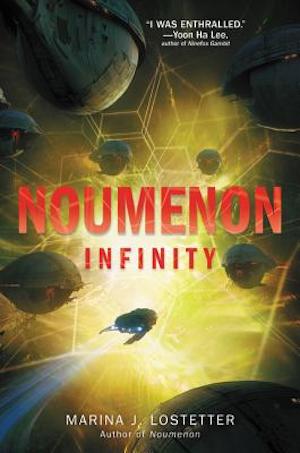
In this delightful sequel, Convoy Seven—a scientific mission from Earth, dispatched centuries earlier and staffed primarily by clones of the original crew—has set off once more to LQ Pyx to study the ancient, unfinished alien structure centered around it—is it a Dyson sphere? A weapon? (Assumption #2!)
This sequel introduces Convoy Twelve, the “lost” mission, which had disappeared while studying dimensional anomalies. They come out the other side of a terrible accident to find themselves face-to-face with a megastructure-creating race of alien beings that have no interest whatsoever in speaking with them. (Assumption #3—of course!)
It’s a common trope in science fiction that alien contact is going to be absolutely consequential when it happens—through wars, or world peace, or a rapid increase in science, for example, so it’s strange that Twelve meets up with the aliens and the aliens are actually hostile to talking with them. But Lostetter’s series is about a larger perspective—it plays out against the scale of the universe itself, over centuries, with entire civilizations as characters, not just individuals. Human beings aren’t very good large-scale thinkers, yet that’s exactly what Lostetter is asking readers to do.
The Convoy Seven side of the narrative continues to be anchored by I.C.C., an AI through which we see how the passing of time affects the mission even as characters are born and die and are born again. Sticking with Convoy Twelve reads as the standard experience of a single crew over days or months. When the timelines merge, nothing about this book is standard. Lostetter wants you to know that assumptions, when placed against a backdrop of the universe and of alien consciousnesses—mean nothing, and can get you in far more trouble than an open mind might. What does it mean to be human? Do you think you really know? Or do you just assume?
Semiosis by Sue Burke
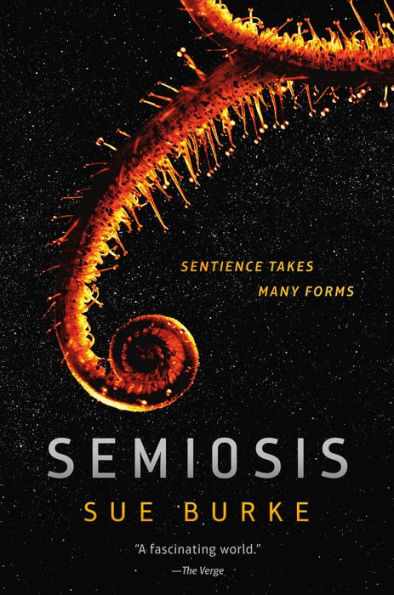
How many ways are there to get wrecked by an alien planet? A bunch of unprepared colonists are about to find out.
The colonists on the planet Pax are pacifists fleeing a war back home, but they don’t find peace in their new settlement—in fact, they’re caught up in a new war, this time between alien life that sides more with “flora” than “fauna.” Pax is hostile to their very DNA; the plants can and will kill them, they can’t grow food, and the soil can’t support the ecosystems that make human life possible.
So they take sides—and, this time, it’s the sentient plant that makes all the assumptions.
No, you didn’t read that wrong. Semiosis, which was inspired by Burke’s own research into the behavior of Earthside flora, is narrated in part by a sentient plant that has had to twice figure out how to incorporate alien life into its own ecosystem, and is attempting to domesticate the human colonists to serve its own needs, as it does not quite understand the humans’ sentience or individuality.
Some writers may take this thought and head off to make a horror movie, but Burke is more interested in communication and building a nascent utopia, and how the two very alien ways of life may learn to coexist as equals. The plant weaves its way into humanity and how human life adapts to it in order to learn how they may eventually be able to learn to coexist. If they can’t, the humans may end up like the lost Glassmakers, the species who came before.
Like Noumenon, this story is told over generations, an acknowledgement that assumptions can kill, and that any true understanding between different aliens occupying entirely different evolutionary niches may actually not be a thing that can occur in one mortal lifetime.
Leviathan Wakes by James S.A. Corey
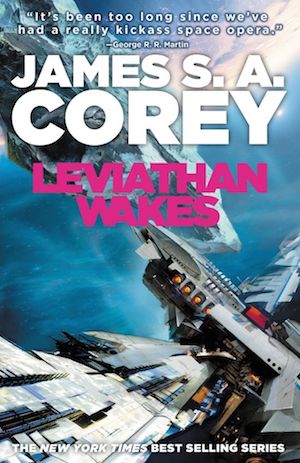
Corporations in science fiction aren’t always evil—but they’re usually out to ruin everyone’s day by assuming this, that, and the other thing, and that’s certainly the case with Leviathan Wakes and its sequels. This time, the Mao-Kwikowski Corporation has uncovered an alien substance known as the protomolecule, and they’re attempting to use it to do what corporations generally want to do: increase their profits. The crew of the Rocinante, captained by idealist James Holden, stumbles upon the conspiracy, which eventually leads to a domino-fall of lies, cover-ups, and all-out war.
Corey’s corporates cause so much trouble because they assume they can control the alien substance—but, throughout, the protomolecule is dispassionate and efficient and largely uncontrollable. The result of human refusal to even try to understand it is death by blindness, death by spaghettification, death by being turned into a blue glowy murder monster or smashed into a thin red goo—you get the picture. Assumptions lead to every single death.
Holden is part of the minority that realize that a healthy scientific respect of the alien devices is the only advantage the humans have in their dealings with the protomolecule. Leviathan Wakes is what happens when you can’t talk to the aliens at all, because they’ve sauntered off and left their toys behind for humans with their many and manifold conflicts to puzzle out and assume (#4? #5? #2827372?) the aliens’ original intentions.
That ends about as well as you’d imagine.
Binti by Nnedi Okorafor
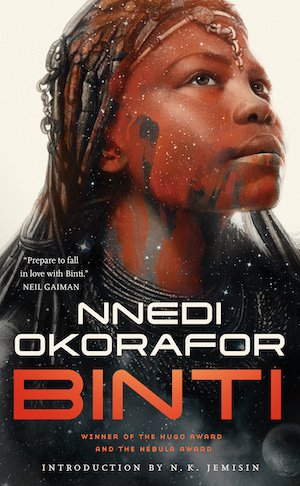
And then there are the times when assuming the aliens might want what you want actually turns out to work. (For everyone else, that is.)
Math genius Binti is the first of the Nigerian Himba nation to be accepted to attend college at prestigious, planet-sized Oozma University. On the way there, her ship is attacked by the alien Medusae, and out of hundreds of people, Binti becomes the only survivor, and she proposes to make peace between the two sides. At the heart of the tentacular Medusae is a serious, bleeding hurt, something that came from a misunderstanding of human origin. But, to do this, the aliens transform Binti into something closer to them.
Binti is then faced with bearing the brunt of other people’s assumptions. When you’re the alien wherever you go, when you’ve undergone mental and physical trauma that takes you away from everything you knew and every human truth you thought was real, how do you communicate with the alien in yourself? How do you reconnect with a world that no longer recognizes you?
Binti’s transformation pushes her to become a peacemaker, showing her world that although difference is a given and misunderstanding assumed, staying in that place of unlike me doesn’t have to be. That like me is still more true than not, no matter who you are.
It just might take a little work to get there.
Buy the Book
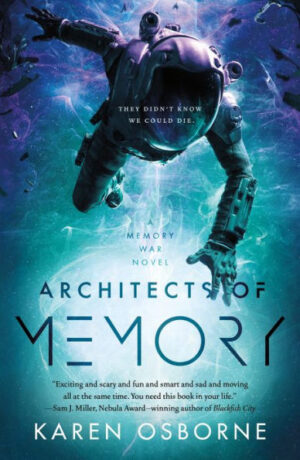

Architects of Memory
Karen Osborne is a writer, visual storyteller and violinist. Her short fiction appears in Uncanny, Fireside, Escape Pod, Robot Dinosaurs, and Beneath Ceaseless Skies. She is a member of the DC/MD-based Homespun Ceilidh Band, emcees the Charm City Spec reading series, and once won a major event filmmaking award for taping a Klingon wedding. Her debut novel, Architects of Memory, is available from Tor Books.










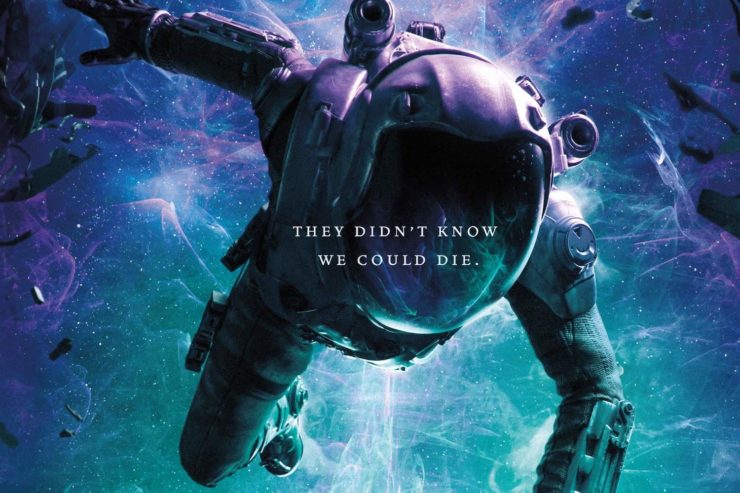
Read Children of God. It isn’t as groundbreaking as The Sparrow, but it is necessary to heal your heart after reading the first book.
The basic premise of Cherryh’s entire Foreigner series is “Assuming aliens are just like you might get you killed” (or lead to an all-out war).
I guess pretty much everyone knows that, though, so it’s good to learn of other takes on the concept :-).
Stop everything and read the sequel to the Sparrow. It completely changes your perspective on everything that happened!
Noumenon Infinity looks very interesting. However, I’m not a big fan of reading the second book in a series without reading the first book. Is the first book worth reading, too?
How about The Chanur Saga by C. J. Cherryh? Bit of a twist as to the aliens in that one.
Yes, yes, read Children of God. It is, if not the simplicity on the other side of complexity, at least the beauty on the other side of complexity.
I must be the only one who didn’t enjoy Children of God. I absolutely loved the Sparrow and it devastated me. Trying not to go too in detail because of spoiler reasons but I wasn’t a fan of Children of God. I never finished it so I may be missing some things but I really didn’t like how they handled one the main characters from the first book. Also I see how the new POV is interesting and important but I just feel like it cheapened the impact of the first book.
Living in Ostia Antica I can confirm it is not an alien city yet, but who knows what 2020 may bring? Thanks for the article and greetings form the ancient port of Rome.
Am amazed nobody mentioned OSC’s Speaker for the Dead, which is my instant go-to for this premise. It’s not necessarily a successful novel, because the characterisation and background doesn’t always work, but it has a “human priest acts as missionary to likeable aliens with tragic results” plot-line.
Although thinking about it it’s the inverse: “aliens try to honour humans with tragic results” because they assume that the human life-cycle is like theirs.
@9 – Ninja’d me. That was the second one I thought of on this topic beyond The Sparrow.
@2 – Since you mentioned CJ Cherryh, Cuckoo’s Egg is a pretty great look at first contact. I don’t want to spoil anything, but the entire premise hinges on the aliens being, well, not like us and quite deadly indeed.
Timothy Zahn’s Conquerer’s Trilogy is about a first contact that doesn’t go well
@5 – Chanur’s Saga is my absolute hands-down favorite depiction of aliens. The aliens are perfectly non-human and yet completely comprehensible – from their own perspective. I think it helps that the human is never given the POV, and that the languages are never quite translatable.
I should re-read those. Thanks for the reminder.
Echoing everyone who says to read The Sparrow’s sequel. It is more character- and theme-driven than the first book but just as interesting
@@@@@#9 : Hyperion by Dan Simmons. Catholic priest amongst mostly friendly space aliens who are fond of saying ‘We are the cruciform’. Finding out what that means…let’s say, not what he thought going in.
I can’t say more without spoilers, but The Three Body Problem fits into this category beautifully and is an amazing book.
In Alan Dean Foster’s “Midworld” the corporate raiders don’t realize that the planet is sapient.
Humans had a pretty good idea the eponymous Black Cloud in Hoyle’s The Black Cloud wasn’t human, what with it being a sentient cloud of space gas large enough to alter climate on Earth, but once they started talking to it, certain communication modes proved to be surprisingly lethal.
Not a deadly misunderstanding as such, but the humans in The Jupiter Theft waste a certain amount of time trying to work out which Cygnans are male and which female. This proves to be a fundamental misunderstanding of Cygnan reproductive biology, which is a lot more like anglerfish than human. There _is_ a potentially lethal misunderstanding, however, which is that the human militarists think their futile attack on the Cygnans can do more than to delay the Cygnans a bit, which would mean the difference between the Cygnans exiting the Solar System on a course where the lethal beam of their space drive does not fry the Earth and them leaving on a course where it does.
John Hemry’s The Lost Fleet introduces us to three alien species: The enigma whose passion for privacy and secrecy means they literally rather die than communicate with us. Killer teddy bears who also refuse to talk, and finally the Wolf-Spiders, possibly the ugliest species ever who clearly want to be friends but whose communications are so delphic that a contact specialist begs the admiral to shoot him now and end his misery.
I no longer remember the title but a YA book I purchased from Scholastic back in 1971 featured a very human appearing alien, who helpfully explained his appearance was so unearthly human brains flat out refused to process it, substituting a comforting illusion instead. Which led to me spending a certain amount of time wondering what it did look like.
Frank Herbert’s ConSentiency–standard Frank Herbert warnings apply–manages a fairly spectacular misunderstanding despite being composed of a number of intelligent species. The Calibans from whom the ConSentiency licenses the JumpDoors on which long range interstellar travel appear to be taken for just another intelligent biological species. In fact, Calibans are not biological as we’d understand it, the ConSentiency has been dealing with fewer Calibans than they believe, and the JumpDoors have significant drawbacks users probably wanted to know about before becoming dependent on them, with the result weaponized bottom-spanking may well kill trillions of people.
Blindsight by Peter Watts has a pretty unusual alien species and it definitely operates in a way the first contact crew do not expect.
Cherryh has a lot of books about opening one’s mind enough to deal with the alien. (And a number of her books with no aliens deal with the mistakes made by people who think that they understand other humans.) In addition to the abovementioned, I’d note the Faded Sun trilogy (a particularly strong example, in which humans don’t realize they’ve been dealing with only one facet of an alien species) and Forty Thousand in Gehenna.
The central point of Stanislaw Lem’s fine novel Fiasco is the humans’ inability to figure out the nature of the aliens. The main character gets it way too late. Lem’s more famous novel, Solaris, is also about an inscrutable alien intelligence that isn’t doing humans any big favors.
Larry Niven’s Protector is an interesting example of this As is his World of Ptaavs. Indeed, the entirety of all the Man Kzin wars stories reflect this.
Aliens are alien. If you forget this, you can die very quickly.
Far from being rare, stories where assuming aliens are just like you might get you killed are a staple of science fiction.
Yes, if the aliens are physically similar to us maybe some humans would want to make a goodwill assumption. Less likely I think if they’re photosynthetic as in Return of the Yggdrasil or Semiosis.
One of TOR’s own books is a very sharp example of this:
*A Darkling Sea* by James L. Cambias. TOR, 2014. The aliens live in a water ocean under a mile of ice and are visually blind.
Illegal Alien by Robert J. Sawyer. Though, to be fair, it was the alien’s assumption rather than the human’s. Another plus for me is that this is a standalone book.
Lamb with garum sounds pretty alien to me unless it’s marinated.
I loved The Sparrow. It’s in my top five of all time. I re-read it often. I HATED Children of God. HATED, HATED, HATED. I had to delete it from my memory. I found large parts of it to feel out of character (IMO). The diversity of characters felt force when it was effortless in the first one. Parts of it felt just cruel and mean and upsetting. The first one had intense moments but I wasn’t upset by anything. I haven’t gone back. I am reading evreyone’s comments with interest. I’m glad it worked well for many. I wanted to love it and was surprised how strongly I did not like the sequel.
Cherryh: absolutely. We were also talking recently in another thread about Mary Gentle’s Orthe books, where a scientist ostensibly trained in first contact finds out just how alien the aliens can be when you allow your assumptions to gloss over reality.
Highly recommend Connie Willis’ novella “Spice Pogrom” on the dangers & joys of misunderstanding aliens. I think her “All Seated on the Ground” had a similar theme too.
Adrian Tchaikovsky’s Children of Time series deals with terraforming gone weird with humans landing on a planet which was seeded with life but the seeding resulted in the uplifting of non human species. Subsequently the humans find another planet in the solar system with its own alien ecology. Add in a possibly insane AI and a more sane AI. All in all a fascinating read.
For some reason I found The Sparrow one of the nastiest books I’ve ever read!Will the sequel change my reaction?
@wub ‘Speaker of the dead’ definitely came to mind. Though I think Ender’s Game itself would qualify…
This article reminded me a story I read around 1983, in a ‘best of the year” collection. IIRC, it was about scientists who could see through some kind of portal into an alien world. One of them becomes very enamoured of the cozy family scene he witnesses and finds a way to cross over. It does not end well. Can anyone identify this story?
So happy to see Semiosis on this list! That and the sequel, Interference, are some of the best SF novels I read in the last year!